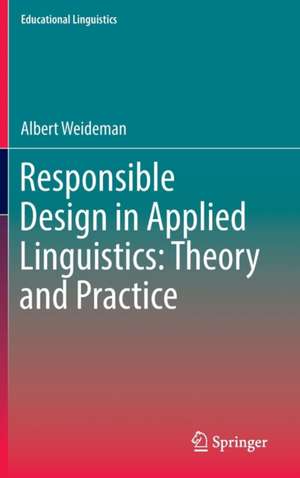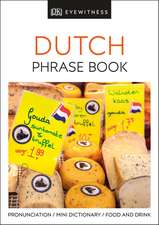Responsible Design in Applied Linguistics: Theory and Practice: Educational Linguistics, cartea 28
Autor Albert Weidemanen Limba Engleză Hardback – 13 sep 2016
No mere history of applied linguistics, this volume presents a framework for interpreting the development of applied linguistics as a discipline. It offers a systematic account of how applied linguistics has developed, articulating the philosophical premises that have informed both its emergence and its subsequent growth. It asks questions that are seldom asked: Where does the discipline derive from? Where is it heading? What directions has it already taken? Which direction should it embrace in future? What is the relative worth of all of the variation in design and methods that have been developed by applied linguists? In defining applied linguistics as a discipline of design, it takes us beyond the diffuse and sometimes contradictory conventional definitions of the field. The framework of design principles it proposes not only helps to explain the historical development of applied linguistics, but also provides a potential justification for solutions to language problems. It presents us with nothing less than an emerging theory of applied linguistics.
| Toate formatele și edițiile | Preț | Express |
|---|---|---|
| Paperback (1) | 383.01 lei 6-8 săpt. | |
| Springer International Publishing – 15 iun 2018 | 383.01 lei 6-8 săpt. | |
| Hardback (1) | 390.26 lei 6-8 săpt. | |
| Springer International Publishing – 13 sep 2016 | 390.26 lei 6-8 săpt. |
Din seria Educational Linguistics
- 18%
 Preț: 952.92 lei
Preț: 952.92 lei - 15%
 Preț: 640.22 lei
Preț: 640.22 lei - 20%
 Preț: 495.48 lei
Preț: 495.48 lei - 18%
 Preț: 945.25 lei
Preț: 945.25 lei - 15%
 Preț: 645.08 lei
Preț: 645.08 lei - 18%
 Preț: 881.63 lei
Preț: 881.63 lei - 15%
 Preț: 640.22 lei
Preț: 640.22 lei - 15%
 Preț: 632.12 lei
Preț: 632.12 lei - 15%
 Preț: 629.84 lei
Preț: 629.84 lei - 20%
 Preț: 555.52 lei
Preț: 555.52 lei - 18%
 Preț: 933.78 lei
Preț: 933.78 lei - 20%
 Preț: 563.96 lei
Preț: 563.96 lei - 15%
 Preț: 633.87 lei
Preț: 633.87 lei - 20%
 Preț: 568.43 lei
Preț: 568.43 lei - 15%
 Preț: 638.10 lei
Preț: 638.10 lei - 15%
 Preț: 638.75 lei
Preț: 638.75 lei - 18%
 Preț: 892.88 lei
Preț: 892.88 lei - 15%
 Preț: 634.06 lei
Preț: 634.06 lei - 15%
 Preț: 644.30 lei
Preț: 644.30 lei - 15%
 Preț: 638.93 lei
Preț: 638.93 lei -
 Preț: 387.22 lei
Preț: 387.22 lei - 15%
 Preț: 640.53 lei
Preț: 640.53 lei -
 Preț: 390.64 lei
Preț: 390.64 lei - 15%
 Preț: 644.62 lei
Preț: 644.62 lei -
 Preț: 389.88 lei
Preț: 389.88 lei - 18%
 Preț: 891.02 lei
Preț: 891.02 lei - 18%
 Preț: 722.91 lei
Preț: 722.91 lei - 15%
 Preț: 633.74 lei
Preț: 633.74 lei - 18%
 Preț: 1105.18 lei
Preț: 1105.18 lei
Preț: 390.26 lei
Nou
Puncte Express: 585
Preț estimativ în valută:
74.74€ • 77.01$ • 62.61£
74.74€ • 77.01$ • 62.61£
Carte tipărită la comandă
Livrare economică 22 februarie-08 martie
Preluare comenzi: 021 569.72.76
Specificații
ISBN-13: 9783319417295
ISBN-10: 3319417290
Pagini: 210
Ilustrații: XV, 239 p. 7 illus.
Dimensiuni: 155 x 235 x 16 mm
Greutate: 0.54 kg
Ediția:1st ed. 2017
Editura: Springer International Publishing
Colecția Springer
Seria Educational Linguistics
Locul publicării:Cham, Switzerland
ISBN-10: 3319417290
Pagini: 210
Ilustrații: XV, 239 p. 7 illus.
Dimensiuni: 155 x 235 x 16 mm
Greutate: 0.54 kg
Ediția:1st ed. 2017
Editura: Springer International Publishing
Colecția Springer
Seria Educational Linguistics
Locul publicării:Cham, Switzerland
Cuprins
Acknowledgements.- Prologue.- Chapter 1: The foundations of a discipline of design.- Chapter 2: A linguistic explanation for the foundations of applied linguistics.- Chapter 3: An inter-disciplinary view of applied linguistics.- Chapter 4: The scientific status of applied linguistics.- Chapter 5: Applied linguistics as a discipline of design.- Chapter 6: Technocratic and revolutionary designs: Three illustrations.- Chapter 7: Beyond method and towards accountability.- Chapter 8: Themes and styles of doing applied linguistics.- Chapter 9: Innovation and eclecticism: Resistance and continuity.- Chapter 10: A returning question: Defining the field of applied linguistics.- Chapter 11: Design principles and the future of applied linguistics.- Bibliography.- Index.
Textul de pe ultima copertă
No mere history of applied linguistics, this volume presents a framework for interpreting the development of applied linguistics as a discipline. It offers a systematic account of how applied linguistics has developed, articulating the philosophical premises that have informed both its emergence and its subsequent growth. It asks questions that are seldom asked: Where does the discipline derive from? Where is it heading? What directions has it already taken? Which direction should it embrace in future? What is the relative worth of all of the variation in design and methods that have been developed by applied linguists? In defining applied linguistics as a discipline of design, it takes us beyond the diffuse and sometimes contradictory conventional definitions of the field. The framework of design principles it proposes not only helps to explain the historical development of applied linguistics, but also provides a potential justification for solutions to language problems. It presents us with nothing less than an emerging theory of applied linguistics.
Caracteristici
Offers a unique systematic account of the discipline of applied linguistics Provides a framework that enables both practicing and prospective applied linguists to interpret the history of the discipline Offers a measure of the relative worth of various traditions in designing language assessments, language courses and language policies











